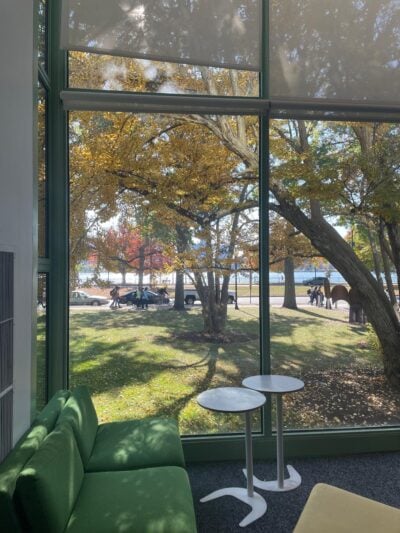
The Romance of Learning by Emiko P. '25
rainy days, language tests, and a book called Babel
I took a test early last week for my Japanese language and culture class.01 21G.S55: Japanese V I woke up early that morning to study for it, scrubbing the sleep from my half-conscious brain and heavy eyelids. I cracked open my textbook and traced out kanji characters, brushed up on Japanese geography, and drilled myself on the grammar we had learned in that unit.
Kanji characters and hiragana were still swimming in the back of my mind as I scootered across the bridge to my test. It was raining, and the Charles River was a churning, thick gray. Puddles of water sprayed up onto my backpack, and I wondered if I would be taking my test just the slightest bit damp.
The test began with an interview in Japanese conducted by my professor, where a partner and I were drilled on the differences between Japanese and English spoken word. We then moved onto the written portion of the test, where I assigned pronunciations to hordes of kanji characters – the slightest deviation of curve changing the kanji’s meaning entirely. I translated vocabulary and long-winded sentences, making sure to use one of the 32 new grammar strategies we had learned in the previous units.
After I finished the test, I wandered to Hayden Library, settling onto one of the cushioned seats by the massive windows on the first floor. The windows face the river, and the infinite dimples in the Charles let me know that it was still raining. I ate a sandwich and a Honeycrisp apple that my roommate gave to me after apple picking. It all tasted particularly sweet now that my test was out of the way. I had just started to read the book Babel the day before, so I picked it up and read a bit before my next class.
Babel is a fantasy novel by R.F. Kuang about a young Chinese scholar studying at Oxford in the 1830s, navigating racial and colonialist tensions. The setting aligns similarly with actual historic events, except for the fact that this world’s energy runs off mysterious and magical silver bars that derive their power from translating words between languages.
Thus far, the book had mostly been describing the main character’s academic adventures:02 This book is about <em>much </em>more than just academic adventures. In fact, it has many lessons that I think would specifically resonate with MIT students. Definitely check it out!! his sudden access to deep knowledge and his language translation research at Oxford University. Reading this book – imagining the young scholar working at a library similar to the one I was sitting in, dissecting literature, composing essays, and carefully assembling and puzzling over information like a Rubik’s cube – reminded me of myself that very morning studying for my Japanese test. In fact, in even broader terms, it reminded me of MIT.
I was reminded of my problem set for 16.85103 Introduction to Satellite Engineering that I had been wading through the past two days – twelve questions focused on a different aspect of satellite communication, power design, and image processing. I was reminded of the first 7.01404 Introductory Biology test this semester and how analyzing molecular interactions and compositions was a welcome puzzle. I was reminded that my work at MIT is an endeavor, an adventure – the equivalent of this magical version of Oxford and Babel. A part of me felt jealous of the main character, that he was lucky enough to read and devour knowledge and entirely devote himself to learning – until I realized that that is quite literally what I am doing at MIT and what I have been doing for over three years.
That realization was quickly followed by a feeling of crushing, immense gratitude for the opportunity to learn. Suddenly, studying for a test, grinding out a PSET in the library, and devoting every single brain cell to the task of understanding Thermofluids or Controls or Structures seemed like the most utterly romantic thing to do in the world. To devote yourself fully to the broadening and deepening of the mind, to dissect a problem down to its fundamental components, then to go through the mental rigor of recomposing the knowledge – so that by the end, you can sit back in your chair and understand how the world works just a bit better. All that work so that you can hold an everyday item in your hands and say, I know how this was made, or so you can look at the sky and say, I know how the Earth and Moon dance and spin.
It truly is a gift to be a student.
Swapping out one magical world for another, I closed my book and headed to my next class.

the big window in hayden i sat and read by
- 21G.S55: Japanese V back to text ↑
- This book is about much more than just academic adventures. In fact, it has many lessons that I think would specifically resonate with MIT students. Definitely check it out!! back to text ↑
- Introduction to Satellite Engineering back to text ↑
- Introductory Biology back to text ↑